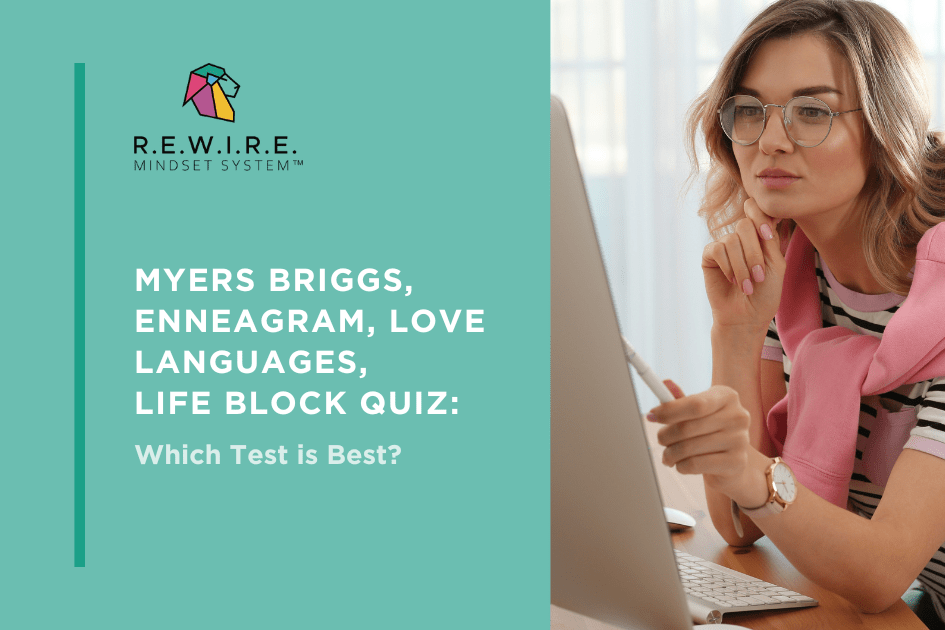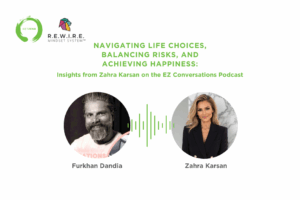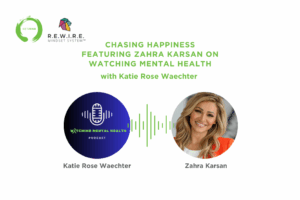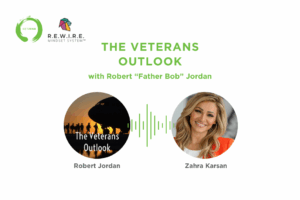As public consciousness continues to grow and expand, the human desire to understand ourselves and those around us grows, too.
Personality tests are a great way to learn more about yourself and others. And among the dozens of personality quizzes available online, three have risen to star-level popularity: the Myers Briggs Type Indicator (MBTI), the Enneagram system, and the Five Love Languages by Gary Chapman.
Each of these personality tests offers a unique lens through which a person can explore their behavior, preferences, desires, and relationships—but which test is the best?!
With a projected 15% annual growth rate (more than 80% of Fortune 500 employers now admit to using personality tests as part of their hiring process!), understanding how personality tests benefit you will help you to stay on top of your personal and professional development.
Let’s take a look at a handful of the most popular free personality tests available, and why each one has unique pros and cons.
Myers Briggs Type Indicator (MBTI)
The Myers Briggs Type Indicator, developed by Katharine Cook Briggs and her daughter Isabel Briggs Myers, is one of the most widely used personality assessments globally.
Based on Carl Jung’s theory of psychological types, the MBTI categorizes individuals into one of 16 personality types, each defined by four dichotomies: extraversion vs. introversion, sensing vs. intuition, thinking vs. feeling, and judging vs. perceiving.
Pros:
- Widespread Popularity | The MBTI is widely recognized and used in a variety of contexts, from workplaces to educational institutions to social services.
- Clear Typology | The 16 personality types provide a clear, structured framework for understanding differences in how individuals perceive and interact with the world around them.
- Self-Reflection | Individuals often find the MBTI insightful for self-reflection, leading to enhanced self-awareness and deeper interpersonal relationships.
Cons:
- Simplistic Dichotomies | Critics of the MBTI system argue that it oversimplifies the complexity of human personality, forcing people into rigid, conforming social categories.
- Limited Scientific Data | The scientific validity of the MBTI has been questioned for a long time, with some researchers highlighting the lack of empirical evidence supporting its reliability.
Enneagram System
The Enneagram is an ancient personality system that divides individuals into nine interconnected personality types, or “numbers”. It explores how individuals perceive and respond to the world, focusing on core motivations and fears—most stemming from early childhood experiences.
Each Enneagram “type” is represented by a number (1-9), and individuals may also exhibit characteristics of neighboring types under stress or growth (known as their Enneagram “wing”).
Pros:
- Nuanced Insights | The Enneagram provides nuanced, in-depth insights into the motivations and fears that drive individuals, offering a compassionate understanding of human behavior.
- Dynamic Growth Model | Unlike static personality assessments, the Enneagram recognizes the fluid nature of human personality, allowing for personal growth and development beyond the result you’re assigned at the end of the test.
- Relationship Dynamics | The Enneagram system explores how different types/”numbers” interact, giving test takers valuable insights into both platonic and intimate relationship dynamics.
Cons:
- Complexity | Because of its depth and descriptiveness, the Enneagram can be extremely challenging to understand, especially for personality test beginners. This firehose of information, in the wrong context, could potentially lead to misinterpretation and frustration.
- Lack of Scientific Validation | Similar to the MBTI, the Enneagram lacks a good amount of scientific validation, which raises concerns about its reliability as a psychological tool.
Five Love Languages by Gary Chapman
Over the last two decades, Gary Chapman’s Five Love Languages has gained an impressive amount of popularity in the realm of relationship and marital counseling.
The premise is that individuals express and perceive love in five primary ways: words of affirmation, acts of service, receiving gifts, quality time, and physical touch.
Understanding one’s love language, as well as that of their partner, can enhance communication and strengthen relationships.
Pros:
- Practical Application | Unlike the psychological headiness of the Enneagram or the extensive data presented with MBTI, the love languages offer easy, actionable tips into how individuals can express and receive love in relationships—right here and now.
- Broad Applicability | The concept of love languages is applicable to many different types of relationships and isn’t limited to romantic partnerships.
- Communication Enhancement | Identifying and understanding love languages can improve communication, help individuals feel fulfilled emotionally, and reduce misunderstandings in relationships.
Cons:
- Simplicity | Some might say the love languages system oversimplifies the complexities of human relationships, to the point of making it “too watered down”.
Individual Variability | Critics argue individuals might not neatly fit into just one love language category, and that preferences can change over time—making it difficult to identify a sustainable ‘takeaway’ from the quiz.
Introducing the Life Block Quiz
In the sea of these (and other) established personality assessments, Zahra Karsan’s Life Blocks Quiz has quickly moved into the spotlight as an approachable, reliable, and deeply vetted personality test alternative.
Developed by a positive psychology expert, this expertly crafted quiz aims to identify unconscious roadblocks that hinder personal growth and happiness.
The quiz employs a unique approach by categorizing individuals into one of 10 Animal Archetypes, providing a fresh perspective on conscious and unconscious behavior.
Benefits of the Life Block Quiz:
- Holistic Understanding | The Life Blocks Quiz considers both conscious and unconscious aspects of behavior, providing the test taker with a holistic understanding of their motivations and actions.
- Accessibility | The quiz is designed to be straightforward, making it suitable for individuals of all ages seeking a user-friendly tool for self-discovery.
- Integration with Existing Knowledge | The Life Blocks Quiz complements well-established assessments like the MBTI, Enneagram, and Love Languages, offering an integrated perspective on human personality.
Which Test Is Best?
In the realm of personality assessments, the Myers Briggs Type Indicator, Enneagram system, and Five Love Languages have each carved out a niche, providing valuable insights into the intricacies of human behavior and relationships.
That said, no single test is a one-size-fits-all solution.
For that reason, positive psychology expert Zahra Karsan designed the Life Blocks Quiz as an alternative that brings a unique perspective to the table.
As a complement to well-known tests like the MBTI, Enneagram, and Love Languages, the Life Blocks Quiz provides individuals with a more comprehensive toolkit for self-discovery and personal growth.
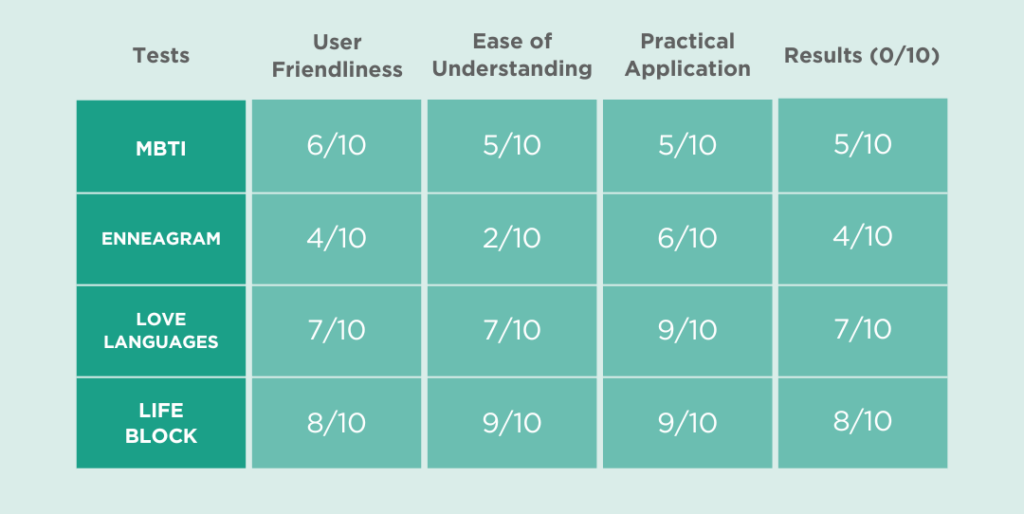
Are you ready to uncover your Animal Archetypes and discover the roadblocks that might be affecting your life, relationships, and career?
Take the FREE Life Blocks Quiz and embark on a journey towards enhanced self-awareness and personal development.

